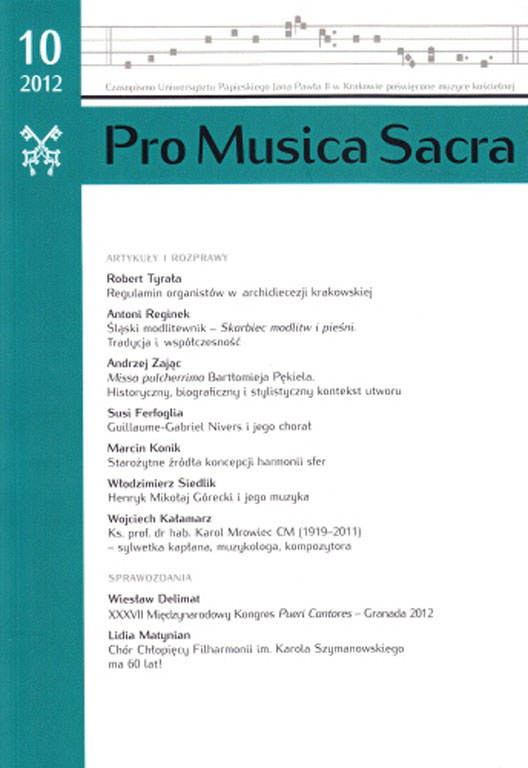Regulamin organistów w archidiecezji krakowskiej
DOI:
https://doi.org/10.15633/pms.336Słowa kluczowe:
The Book of Rules and Regulations for the Organists, Cracow Archdiocese, contracts, appendix, history of the regulations in 20th c.Abstrakt
The proceedings towards the regulation of organists’ status in church life in the Cracow Diocese have had a long and interesting history. The history which featured wise bishops, as well as brave seculars and clergy who have raised this issue. The presented facts perhaps help to understand complexity of the problem and demonstrate what has been accomplished for the last several years.
It was the years 1997–2012 that intensive works on changing the attitude towards the significance of sacred music were carried out in the Cracow Archdiocese; Employment contracts were signed in 150 parishes (35% of Archdiocese), contracts for specific works – in 15 parishes; voluntary employment contracts in 90; and others (no regulations, mutual agreements, etc.): in 55 parishes. The total number amounts to 310 (67%). Clearly, upon introducing new regulations an employment contract is the commonest form of employment. Nevertheless, as figures show, in over 150 parishes and other pastoral centers of the archdiocese employment has not been regulated so far. It is perhaps because some parishes are too small to employ an organist, some simply cannot afford the one, yet in many of them the awareness of this problem has systematically risen. The Archdiocesan School of Music of 2nd Degree has 80 students, and the Intercollegiate Institute for Church Music – almost 40. The organists’ posts at primary archdiocesan churches are held by musicians with master degrees who are the organists of great creativity. The members of the Archdiocesan Commission for Church Music are the authorities commonly recognised in the music milieu of the archdiocese (both seculars and clergy). Organists’ self-development and improvement of sacred music towards higher standards have been given constant support from the Cracow diocesan bishop (as proved by his letter of 2005 written of the Feast of St. Cecilia; and by 7 other letters so far). Days of reflection and retreats are organised for about 200 organists. After issuing The Rules and Regulations of Instruments Renovation and Ordering from Abroad care for pipe organist has risen considerably. In autumn 2012 visiting parishes, with regard to music, is planned to be carried out.
Pobrania
Opublikowane
Numer
Dział
Licencja
Prawa autorskie (c) 2012 Robert Tyrała

Utwór dostępny jest na licencji Creative Commons Uznanie autorstwa 4.0 Międzynarodowe.
Autorzy publikujący w czasopiśmie udzielają jego wydawcy zgody o następującej treści:
- Autor zachowuje autorskie prawa majątkowe do utworu, a jednocześnie udziela wydawcy czasopisma zgody na jego pierwszą publikację w wersji drukowanej i wersji online na licencji Creative Commons Uznanie autorstwa 4.0 Międzynarodowe oraz zgody na wykonywanie opracowań, w tym przekładów.
- Autor ma możliwość udzielania zgody niewyłącznej na opublikowanie utworu w wersji, która ukazała się w czasopiśmie (np. zamieszczenia go w repozytorium instytucjonalnym lub opublikowania w książce), wraz z informacją o jego pierwszej publikacji w czasopiśmie.
- Autor może umieścić swój utwór online (np. w repozytorium instytucjonalnym lub na swojej stronie internetowej) jeszcze przed zgłoszeniem utworu do czasopisma.

